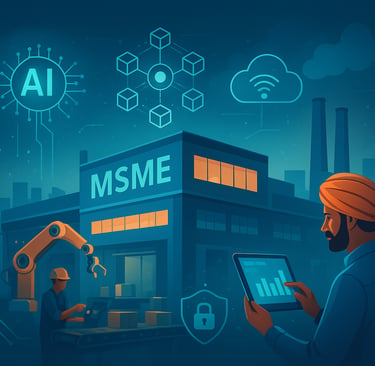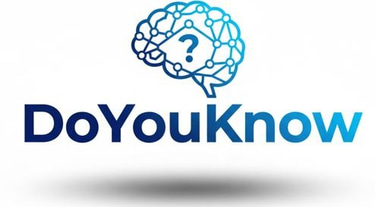Do You Know How Indian MSMEs Are Using Deep Tech to Grow, Compete Globally & Survive Beyond 2025
Discover how Indian MSMEs are adopting deep tech innovations like AI, blockchain, and IoT to thrive and compete globally post-2025.
BUSINESS & ECONOMY
Do You Know Team
9/25/20255 min read


India’s Micro, Small, and Medium Enterprises (MSMEs) are often called the “silent growth engines” of the country. From local kirana stores to small textile exporters and innovative manufacturing hubs, MSMEs make up over 63 million enterprises across India. They contribute nearly 30% to the national GDP, account for 45% of exports, and employ over 110 million people. In short, without MSMEs, India’s economy cannot function.
But in today’s era, traditional ways of running a business are no longer enough. The world has changed rapidly due to the digital revolution, globalization, supply chain disruptions, climate concerns, and AI-driven competition. For MSMEs, survival depends on adopting technologies once thought too “advanced” or “expensive.”
That’s where deep tech comes in.
Deep technologies—like Artificial Intelligence (AI), Blockchain, Internet of Things (IoT), Robotics, 3D Printing, and Cybersecurity solutions—are no longer reserved for tech giants in Silicon Valley or Bengaluru startups. Post-2025, even India’s smallest enterprises are finding ways to leverage these tools to cut costs, improve productivity, build trust, and expand globally.
This article explores in detail how Indian MSMEs are surviving and thriving with deep tech after 2025, backed by real-world examples, government support, and global case studies.
The Reality Check: Why MSMEs Had to Embrace Deep Tech
The journey of MSMEs in India has never been easy. The sector has faced multiple challenges:
High operational costs due to inefficient supply chains.
Limited access to credit because banks prefer lending to larger corporations.
Global competition from cheaper imports, especially from China.
Skill gaps as many workers lack digital knowledge.
Market unpredictability, made worse by COVID-19 and geopolitical shifts.
By 2025, one truth became undeniable: Only technology could help MSMEs survive.
A small manufacturer in Kanpur making leather products, a handicraft exporter in Jaipur, a logistics provider in Chennai, or a fintech startup in Bengaluru—all realized that without adopting deep tech, they would be left behind.
Now, let’s dive into how deep tech is transforming MSMEs across India.
AI-Powered Decision-Making: From Guesswork to Precision
In the past, many MSMEs relied on instinct or tradition to make decisions. For example, a textile unit in Surat would decide production levels based on seasonal demand “experience.” But AI changed the game.
Today, MSMEs are using AI-driven business intelligence platforms to:
Predict demand more accurately.
Optimize raw material purchases.
Identify profitable customer segments.
Personalize marketing strategies.
For instance, an Ayurvedic skincare MSME in Kerala adopted AI to track online reviews, customer feedback, and competitor pricing. Within a year, it increased revenue by 40% because it could launch products customers were actually asking for.
AI is no longer a luxury; it’s a necessity for survival.
Blockchain: Building Trust in an Uncertain World
Trust is the foundation of business, and blockchain has emerged as the technology to secure it.
Supply Chain Transparency: An MSME making organic spices in Tamil Nadu uses blockchain to prove authenticity to international buyers. This reduces fraud and increases exports.
Smart Contracts: MSMEs exporting garments to Europe now use blockchain-enabled contracts to ensure payment security. No middleman is needed.
Financial Trust: Blockchain-powered digital lending reduces risks for banks, allowing MSMEs with little collateral to access credit.
In a post-2025 world where fraud and counterfeit goods are global issues, blockchain provides credibility that helps Indian MSMEs compete abroad.
IoT: Smarter Operations for Small Enterprises
The Internet of Things (IoT) is revolutionizing manufacturing and logistics. Small factories are installing IoT sensors to:
Monitor machine health and predict breakdowns.
Track energy consumption and reduce electricity bills.
Automate inventory management.
Take the case of a Coimbatore-based textile MSME that installed IoT-powered sensors on its looms. The result? Machine downtime reduced by 25%, saving lakhs annually.
Even logistics MSMEs use IoT for real-time vehicle tracking, route optimization, and fuel savings.
Advanced Manufacturing: 3D Printing and Robotics
For decades, MSMEs struggled to compete with big corporations in product innovation. But 3D printing and robotics have leveled the field.
A jewelry MSME in Jaipur uses 3D printing to create intricate designs without heavy investment in molds.
A small auto parts maker in Pune adopted robotics for precision assembly, improving both speed and quality.
This allows MSMEs to prototype faster, reduce waste, and offer customized products—things that large corporations can’t always do quickly.
Cybersecurity: Protecting Digital Trust
As MSMEs go digital, they also face new risks: hacking, phishing, and data theft. Post-2025, many small businesses realized that a cyberattack could wipe them out overnight.
Now, MSMEs are investing in:
AI-driven threat detection.
Blockchain-based identity verification.
Government-supported cybersecurity training.
For example, a Noida-based IT services MSME implemented AI cybersecurity tools after a ransomware scare. Since then, it has secured multiple foreign clients who trust its systems.
Deep Tech in Finance: Digital Lending & UPI 3.0
One of the biggest hurdles for MSMEs has always been access to credit. Banks often reject them due to lack of collateral or formal records.
Deep tech fintech platforms are changing this by:
Using AI for credit risk analysis.
Offering blockchain-based smart lending contracts.
Providing instant UPI-linked microloans.
By 2025, India’s Digital Lending Market crossed $350 billion, and MSMEs were the biggest beneficiaries.
Green Tech: Sustainability as a Competitive Edge
Climate change and ESG (Environmental, Social, Governance) rules are reshaping global trade. For MSMEs, sustainability is no longer a choice—it’s survival.
IoT devices monitor water and energy usage.
AI optimizes supply chains to reduce carbon footprints.
Blockchain validates green practices for global buyers.
For example, handloom cooperatives in Assam adopted solar-powered looms and marketed themselves as sustainable, gaining entry into premium global markets.
Workforce Transformation: EdTech & AI Training
MSMEs can’t thrive without skilled workers. Post-2025, many MSMEs are partnering with AI-enabled EdTech platforms to upskill employees.
Workers learn digital tools through mobile apps.
AI customizes training modules for different roles.
Government initiatives subsidize digital training for MSMEs.
This not only helps employees grow but also improves productivity and retention.
Government’s Role: Digital India, ONDC, and IndiaAI
The government has become a critical enabler for MSMEs adopting deep tech.
Digital India Mission provides internet infrastructure.
ONDC (Open Network for Digital Commerce) democratizes e-commerce, allowing small retailers to compete with Amazon and Flipkart.
IndiaAI Mission is funding AI innovation for MSMEs.
Skill India ensures workforce readiness for Industry 4.0.
Without policy support, MSMEs would struggle to make this technological leap.
Case Studies of Indian MSMEs Using Deep Tech
Farm-to-Fork Startup (Maharashtra): Using blockchain to ensure food traceability for urban consumers.
Handicraft Exporter (Rajasthan): Using AI-based e-commerce analytics to predict global demand.
Manufacturing MSME (Gujarat): Leveraging IoT sensors for machine monitoring, reducing costs by 15%.
Textile Cluster (Tamil Nadu): Using AI-powered design software to create global fashion trends.
Each example shows that deep tech is not just for big corporations—it’s empowering India’s smallest players.
The Road Ahead: MSMEs as Global Innovators
Post-2025, MSMEs are no longer just “local players.” With deep tech adoption, they are becoming global innovators.
They are entering cross-border trade with blockchain contracts.
Competing in global digital marketplaces.
Building sustainable businesses aligned with green goals.
By 2030, experts predict Indian MSMEs could contribute nearly 40% of GDP—powered largely by deep tech.
FAQs
Q1. Why is deep tech crucial for Indian MSMEs after 2025?
Because it enables cost efficiency, transparency, global competitiveness, and resilience against market shocks.
Q2. Are small businesses really able to afford deep tech?
Yes. Cloud-based SaaS, government subsidies, and open-source platforms make deep tech affordable.
Q3. Which deep tech tools are most impactful for MSMEs?
AI (for decision-making), Blockchain (for trust), IoT (for operations), and Fintech (for credit access).
Q4. What role does the government play in this transformation?
Through initiatives like Digital India, ONDC, and IndiaAI Mission, the government is bridging the digital divide.
Q5. How can MSMEs upskill their workforce for deep tech adoption?
By partnering with AI-driven EdTech platforms and participating in government-led digital literacy programs.
Conclusion
MSMEs have always been India’s growth engines. But post-2025, their survival depends on how effectively they adopt deep technologies. Those who embrace AI, IoT, Blockchain, Cybersecurity, Advanced Manufacturing, and Fintech innovations are not just surviving—they are thriving. They are reducing costs, competing globally, and shaping India’s journey towards becoming a $10 trillion economy.
The message is clear: Deep tech is no longer optional for MSMEs. It is their lifeline to the future.
#MSMEs #DeepTech #DigitalIndia #AI #Blockchain #IoT #FutureOfBusiness #Innovation #SMEs #Post2025 #DoYouKnow
Knowledge
Empowering minds with reliable educational content daily.
Newsletter Signup
© 2025 DoYouKnow. All rights reserved.
Stay Ahead of the Trends – Join Our Newsletter
